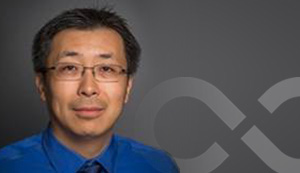Kim joins El-Rayes, McRee in leading HCRN GI Clinical Trial Working Group

Richard Kim, MD, service chief of Medical Gastrointestinal Oncology and senior member in the Gastrointestinal Oncology Department at Moffitt Cancer Center, has been appointed as a co-chair of the Hoosier Cancer Research Network (HCRN) Gastrointestinal Clinical Trial Working Group. He joins fellow co-chairs Bassel El-Rayes, MD, of Winship Cancer Institute at Emory University, and Autumn McRee, MD, of the University of North Carolina Lineberger Comprehensive Cancer Center.
Dr. Kim, who is also professor of oncology at the University of South Florida College of Medicine, dedicates much of his research to hepatobiliary and colon cancers, as well as cholangiocarcinoma, using immunotherapies and targeted therapies. He also is exploring how to convert cold (or unresponsive) tumors to hot (or responsive) tumors in colon cancer. Recently, he gave an oral presentation during the ESMO World Congress on Gastrointestinal Cancer 2020 virtual conference on combining regorafenib and nivolumab. Dr. Kim hopes to provide final data on that research later this year.
“I am honored and privileged to be selected by my colleagues for this co-chair role,” Dr. Kim said. “I’ve been doing this for more than 10 years, so my interest is to harbor and nurture junior investigators who are very motivated, who have ideas, and mentor them to activate a novel trial through Hoosier Cancer Research Network, that could someday possibly make a difference in practice and outcomes.”
Clinical Trial Working Groups (CTWGs) provide a forum where researchers from member institutions collaborate to discuss and develop study concepts, identify potential co-investigators and sites to participate in studies, and review the progress of ongoing clinical trials. CTWGs also provide junior investigators an opportunity to receive scientific feedback and mentorship from their senior peers. The GI CTWG group meets by teleconference every other month and in-person (when possible) at clinical research conferences.
In his new role as co-chair, Dr. Kim would like to see research concepts that address highly unmet area areas of need for patients, such as primary liver cancer, cholangiocarcinoma, and microsatellite instability-high refractory colon cancer.
A graduate of the University of Miami Miller School of Medicine, Dr. Kim has been working with HCRN for almost five years and appreciates the organization’s support for investigator-initiated studies.
“HCRN is very collegial,” Dr. Kim said. “Our goal is to help the investigator in any way, and that’s the benefit. I personally enjoy working with the whole group to try to get a concept through.”
Dr. Kim’s advice to young investigators who are interested in submitting a study concept is to first identify a pharmaceutical company that has similar research goals.
“Once they like the idea of your concept and they’re willing to move forward, then the next step is to determine how many sites that you’ll need to accrue this research in a timely fashion,” Dr. Kim said. “If you require more than one site to accrue participants, then that’s the time to bring the concept to HCRN and present it among our peers to gauge interest level. Once the group decides this is a protocol that we would like to pursue, then the next step would be to go back to the funder and follow up with a full protocol and budget.”
Investigators whose institutions are part of the HCRN Network may participate in any HCRN Clinical Trial Working Group.
About Hoosier Cancer Research Network:
Hoosier Cancer Research Network (formerly known as Hoosier Oncology Group) conducts innovative cancer research in collaboration with academic and community physicians and scientists across the United States. The organization provides comprehensive clinical trial management and support, from conception through publication. Created in 1984 as a program of the Walther Cancer Institute, Hoosier Cancer Research Network became an independent nonprofit clinical research organization in 2007. Since its founding, Hoosier Cancer Research Network has conducted more than 230 trials in a variety of cancer types and supportive care, resulting in more than 350 publications. More than 9,000 subjects have participated in Hoosier Cancer Research Network clinical trials.

Facebook
Hoosier Cancer Research Network on Facebook
Linked In
You Tube
Twitter